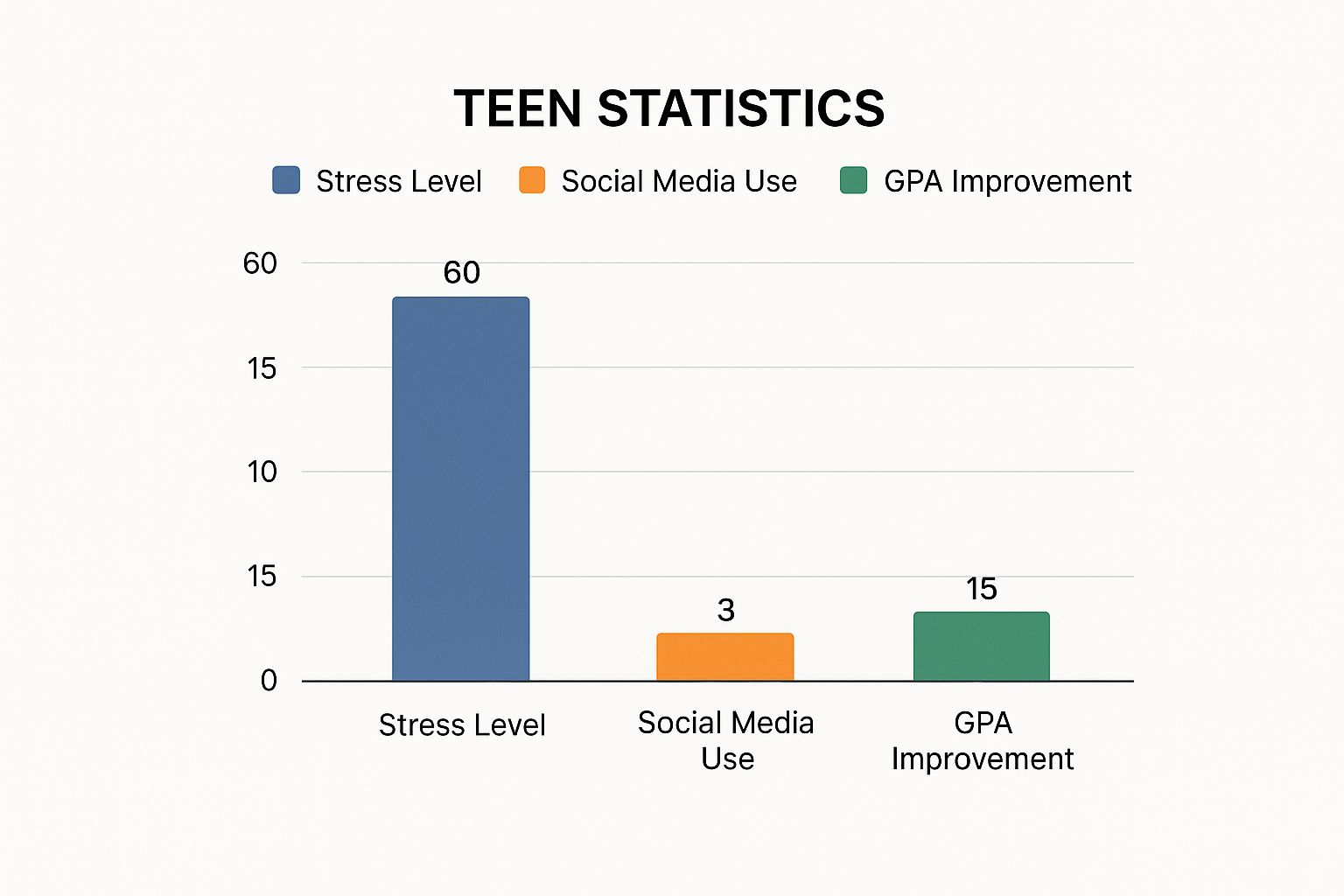Let’s get real for a second: trying to juggle school, homework, a social life, family, and a phone that’s constantly buzzing can feel completely impossible. If you’re a teen who feels buried under a pile of to-dos and permanently behind, you are definitely not alone.
Struggling with time management isn’t some kind of personal failure. It’s the natural result of modern-day pressures clashing with a brain that’s literally still under construction.
The image below really highlights the connection between stress, all that screen time, and how you’re doing in school.

This isn’t just a random assortment of stats. It shows that while stress and social media are a huge part of being a teen today, getting a handle on your time can genuinely help you feel better and do better in school.
The Science Behind the Struggle: School, Motivation, and Procrastination
Here's something you might not know: your brain is in the middle of a massive upgrade. The part responsible for planning, making good choices, and resisting the urge to check TikTok for the tenth time in an hour—the prefrontal cortex—is the very last part to fully mature. We're talking mid-20s.
So, biologically, it’s just plain harder for you to ignore distractions and think about long-term consequences.
On top of that, the world is practically engineered to hijack your focus. Social media apps, video games, and Netflix are all designed to keep you hooked. It creates a perfect storm where that history essay doesn't stand a chance, leading straight to procrastination and that sinking feeling of anxiety. This lack of motivation for school tasks isn't laziness; it's a battle against biology and technology.
Procrastination and Mental Health
Procrastination isn't just you being lazy. Far from it. It’s often a coping mechanism for feeling stressed or totally overwhelmed by a task that seems way too big. Putting it off gives you a moment of relief.
The problem is, that relief is temporary. The procrastination cycle can seriously mess with your mental health, leading to more stress, guilt, and feeling like you’re not good enough. Breaking that cycle is a game-changer for building confidence and cutting down on school-related anxiety.
And if you procrastinate, you’re in good company. Research shows a whopping 75.5% of students say they struggle with it. A big reason why? A staggering 82% of people don’t use any real system to organize their tasks, which just leads to wasted time and a backlog that keeps growing.
You can dig into more of these time management statistics to see the bigger picture. Knowing this is a common struggle can be empowering. It’s not just you. And that means you can find strategies that actually work, instead of feeling like you’re the only one falling behind.
Common Time Traps and How to Escape Them
We all fall into habits that sabotage our best intentions. The trick is to spot them before they completely derail your day. Here are some of the most common time traps I see teens get stuck in, plus a quick fix to get back on track.
| Common Time Trap | What It Looks Like | Quick Solution |
|---|---|---|
| The "Just Five More Minutes" Scroll | You pick up your phone to "check one thing" and an hour disappears on TikTok or Instagram. | Set a specific timer for 5 or 10 minutes before you open the app. When it goes off, put the phone down immediately. |
| Multitasking Madness | Trying to write an essay while texting friends, listening to music, and watching a show in the background. | Pick one thing to focus on. Turn off notifications and close other tabs for a 25-minute work sprint. |
| The "I'll Do It Later" Trap | A task feels too big or boring, so you keep pushing it to the end of the day, then to tomorrow. | Use the 2-minute rule: If a task takes less than two minutes, do it right away. For bigger tasks, just start for 5 minutes. |
| Perfection Paralysis | You spend so much time trying to make the first sentence of a paper perfect that you never get to the second. | Give yourself permission to write a "garbage" first draft. The goal is just to get ideas down on paper, not to make it perfect. |
Recognizing these patterns is the first step. When you catch yourself falling into one of these traps, don't beat yourself up. Just use the quick solution to gently steer yourself back in the right direction.
Connecting Daily Tasks to Your Big Goals

Before you can really organize your time, you need a powerful why. Just making a to-do list feels like another chore, but when you connect those small tasks to something you actually want? That changes everything.
Let’s be real. Time management for teenagers isn't about becoming some productivity robot. It's about making your everyday actions serve your future self.
Think about it this way: why even bother studying for that biology test? It’s not just about passing a class. Maybe it’s a crucial step toward getting into your dream college, or maybe it’s just about proving to yourself that you can nail a tough subject.
That shift in perspective is the secret to unlocking real motivation. It turns boring, annoying tasks into meaningful steps on a path you’ve chosen.
Find Your North Star
What actually matters to you? Not what your parents, teachers, or friends expect. Your real priorities are the fuel for your focus.
To get started, think about these areas:
- Academics: Is there a specific grade you’re aiming for in a class? A particular college you want to get into?
- Extracurriculars: Do you want to make the varsity team? Land the lead in the school play? Finally master that new song on the guitar?
- Personal Life: Maybe you want to save up for a car, learn a cool skill like coding, or just carve out more guilt-free time to hang with friends.
Figuring out these bigger ambitions is step one. If you need some help getting clear, exploring different goals for teenagers can spark some ideas. Once you know your destination, you can start drawing the map.
The key is to turn a vague wish into a concrete objective. “I want to do better in school” is a wish. “I want to get a B+ or higher in Chemistry this semester” is a goal you can actually build a plan around.
Break It Down Into Actionable Steps
Massive goals can feel totally intimidating, which is a perfect recipe for procrastination. The trick is to break them down into ridiculously small, non-scary things you can do every day. This is how your to-do list becomes a powerful tool instead of something you dread.
Let's see this in action.
Big Goal: Make the Varsity Soccer Team Next Season
- Monthly Action: Improve my stamina and footwork.
- Weekly Action: Go for two long runs and do 30 minutes of dribbling drills three times a week.
- Daily Task: "Practice dribbling drills for 30 minutes after school today."
Suddenly, that one task feels completely manageable. It also has a clear purpose. It's not just "kicking a ball around"; it's a direct step toward earning your spot on the team.
This process makes it so much easier to get started and stay locked in, even on days when you’re just not feeling it. This kind of structured approach is fundamental to successful time management for teenagers—it beats overwhelm and builds real momentum toward the things you care about most.
Practical Ways to Finally Stop Procrastinating
Knowing you should tackle a big project and actually starting it are two totally different things. Let's get one thing straight: procrastination isn't a character flaw. It’s usually your brain’s response to feeling overwhelmed, anxious, or just plain bored by a task.
The trick is to have a few go-to strategies you can pull out to break that cycle of avoidance. These aren't just generic tips; they are proven methods that can help you rewire your whole approach to getting things done, turning time management for teenagers from a chore into a skill that serves you for life.
The Power of Working in Sprints
One of the best ways to outsmart procrastination is to trick your brain into just starting. Instead of staring at the mountain of a three-hour study session for your history exam, just commit to a small, focused chunk of time. This is where the Pomodoro Technique is a game-changer.
It’s ridiculously simple:
- Pick one single thing to work on (like writing just the intro to your English essay).
- Set a timer for 25 minutes and work on only that thing. No phone. No distractions. Seriously.
- When the timer dings, take a 5-minute break. Get up, stretch, grab a drink.
- After you’ve done four of these "Pomodoros," give yourself a longer break of 15-30 minutes.
This method works because 25 minutes feels easy. It lowers the mental hurdle to getting started and helps you build real momentum.
The real magic here is that you're training your focus. By working in these short, distraction-free bursts, you’re teaching your brain how to concentrate on demand. That's a skill that will help you in school and way beyond.
Get Your Toughest Task Done First
You know that one dreaded assignment that hangs over your head all day, poisoning your ability to focus on anything else? Mark Twain once said that if you eat a live frog first thing in the morning, nothing worse can happen for the rest of the day. The "Eat the Frog" method applies that same logic to your to-do list.
Your "frog" is your most important—and probably most difficult—task of the day. By tackling it first thing, when your energy and willpower are at their peak, you accomplish two things. You get the hardest work out of the way, and you score a massive psychological win that fuels your motivation for everything else. This one small shift can completely change the vibe of your entire day.
Winning the Mental Game
Sometimes, the root of procrastination isn't the task itself, but the feelings you have attached to it. Perfectionism and anxiety are huge culprits here. The fear of not doing something perfectly can be so paralyzing that it feels easier to just not start at all.
This internal pressure is a major source of stress for a lot of teens. In fact, 55% of high school students say they feel stressed because of their struggles with managing time. You can read more about how teens are dealing with these time management struggles and the strategies that actually help.
If you find yourself stuck in that perfectionist trap, give yourself permission to do a "bad job" on the first draft. The only goal is to start. More often than not, the real barrier is motivation, which is a tricky mix of your mindset and your habits. You can learn more about how to find motivation when you feel stuck, which is a huge piece of the puzzle.
Breaking free from procrastination isn’t just about managing a clock; it's about managing your own mind. And that's one of the most vital skills you can ever build.
How to Manage Your Phone and Other Distractions
Let's be real: your phone is probably the single biggest thing standing between you and getting your work done. This isn't a lecture—I get it. Social media, games, and notifications are literally designed by experts to hook you, hijacking your brain’s reward system and making it almost impossible to look away.
It helps to think of this as a battle for your attention. Taking control of your phone isn't about punishment; it's a strategic move to get your focus and energy back for the things that actually matter to you.
These digital distractions are a massive challenge when it comes to time management for teenagers. Screen time is a huge piece of the puzzle. Globally, Gen Z spends about 9 hours staring at screens every day, with some reports showing averages as high as 9 hours and 24 minutes. You can see more on teen screen time at cosmotogether.com and how it’s changing the game.
Create a Distraction-Free Workspace
The first step is setting up some clear boundaries—both physical and digital—to protect your focus. It sounds almost too simple, but just leaving your phone in another room while you study can be a total game-changer. You’re removing the temptation completely, which lets your brain fully lock in on what you're doing.
Here’s a quick checklist for a 'digital reset' before you sit down to study:
- Move Your Phone: Seriously, put it in another room. Or in a drawer. Out of sight, out of mind.
- Silence the Noise: Use your phone’s "Do Not Disturb" or "Focus Mode" to kill all non-essential alerts.
- Set App Limits: Jump into your screen time settings and put a daily timer on your biggest time-sucks, like TikTok and Instagram.
- Curate Your Feed: Unfollow accounts that make you feel stressed or cluttered. Your feed should be inspiring you, not draining your mental battery.
These small habits add up, creating an environment where you're the one in control. If you’re looking for more ways to stay locked in during a study session, we have a helpful guide on how to focus while studying.
A 'digital detox' isn’t about throwing your phone away forever. It’s about consciously choosing to unplug for a bit so your mind can rest, recharge, and refocus on the real world.
The image below gives a simple definition for a digital detox, framing it as a voluntary break from your devices.

This just drives the point home: managing your phone is about taking intentional breaks, not quitting it entirely. By building these moments into your day, you start to build a much healthier relationship with technology and find it way easier to concentrate when it really counts.
A Parent's Guide to Supporting Your Teen

Here’s the thing about helping your teen manage their time: your role needs to change. You have to shift from being their schedule's manager to being their trusted mentor. It's a subtle but powerful difference.
The goal is to move from managing their schedule to mentoring their growth. This shift builds their independence and shows them that time management for teenagers is about empowerment, not control.
From Micromanager to Mentor
It’s so tempting to jump in and fix things, especially when you see your kid stressed out or procrastinating. But stepping in to organize their life for them usually backfires. It often creates resistance and, worse, it robs them of the chance to figure out their own systems.
Instead of directing, try consulting. Think of yourself as a supportive guide, not the boss. This means asking questions instead of giving orders.
- "That history project looks pretty big. What's your game plan for tackling it?"
- "You seem overwhelmed with everything this week. Is there anything that would help you feel more in control?"
- "I've noticed you're up late finishing homework. How could we shift things around to make your evenings less of a scramble?"
This simple change in how you talk opens the door for them to solve their own problems. It puts them in the driver's seat, which is a huge motivator. You're respecting their autonomy while still being there to help guide the way.
Recognize the Signs of Burnout and Mental Health Struggles
Let's be real: what looks like laziness is often something else entirely. It could be burnout. It could be anxiety. The pressure on teens today is no joke, and their mental health is a massive piece of the time management puzzle. Procrastination and lack of motivation for school are often symptoms of a deeper issue.
There’s a big difference between the two. Laziness is choosing not to do something when you have the energy. Burnout is a state of total emotional and physical exhaustion where you feel like you just can't.
Research from the American Psychological Association found that teens report stress levels that are right up there with adults, especially during the school year. Their struggle isn't a character flaw; it's often a sign of genuine stress, and seeing it that way is the first step to helping.
If your teen is constantly irritable, pulling away from friends and family, or sounds hopeless about their schoolwork, it might be more than just a bad week. It might be time to get some outside help.
Mental Health Resources and Support
Knowing where to turn when things get tough is half the battle. Talking about mental health can feel awkward or scary, but these resources are a solid place to start for both you and your teen:
- The Jed Foundation: This organization is all about protecting emotional health and preventing suicide for teens and young adults. They have fantastic resources.
- Child Mind Institute: Think of it as a library of expert articles on everything from teen anxiety to ADHD. It’s incredibly helpful for understanding what your kid might be going through.
- NAMI (National Alliance on Mental Illness): NAMI offers support groups and educational programs for families who are navigating mental health conditions.
Try to make conversations about mental wellbeing a normal thing in your house. Frame time management not just as a way to get better grades, but as a skill for feeling less stressed and protecting their long-term health. When you model that kind of balanced thinking, you’re giving them tools that will support them for the rest of their lives.
Got Questions? Let's Talk Through Them.
Even with the best game plan, things get tricky. Life happens. What do you do when motivation disappears? Or when your teen just isn't on board? This is where the real work begins. Let's tackle some of the most common hurdles I see teens and parents run into.
How Can I Stay Motivated When I Just Don't Feel Like It?
This is the million-dollar question, isn't it? The honest answer is: you don't. Motivation is fickle. It comes and goes. The real secret is to stop waiting for it to show up and start creating it through action.
Think small. Really small. Don't worry about finishing the whole essay. Just open the Google Doc. Don't stress about studying for the whole chapter. Just read one page.
That tiny first step is often all it takes to build a little momentum. It's also helpful to reconnect with your "why." I get it, that chemistry homework feels pointless. But remember what it's connected to—maybe it's getting into that engineering program you're excited about, or just the freedom of getting it done so you can hang out with friends guilt-free. Tie the boring task to a bigger goal you actually care about.
What If My Teen Resists All My Efforts to Help?
Parents, I feel this one. You see your kid struggling, you try to help, and you get a door slammed in your face (literally or figuratively). It’s beyond frustrating.
When a teen pushes back hard, it’s usually because they feel managed, not supported. They're craving independence, and our well-meaning "help" can feel like control. The single biggest shift you can make is moving from manager to consultant.
Stop saying, "You need to do this." Instead, try asking, "That looks like a lot. What's your game plan?"
This small change in language is huge. It shows you trust them. It respects their autonomy and positions you as an ally they can turn to for advice, not a boss they need to avoid.
Also, remember to model the behavior you want to see and praise the small wins. Acknowledging that they remembered to set their own alarm goes a lot further than nagging them about the one thing they forgot.
Are There Any Mental Health Resources for Overwhelmed Teens?
Absolutely. It's so important to recognize when procrastination and stress are symptoms of something deeper. Time management skills can definitely help with anxiety and burnout, but they aren't a cure. Sometimes, you need more support, and that's completely okay.
There are some fantastic organizations out there focused specifically on helping young people navigate their mental health.
Here are a few I trust:
- The Jed Foundation: An incredible resource focused on emotional health and suicide prevention for teens.
- Child Mind Institute: Offers expert articles and guides on a huge range of teen mental health topics.
- NAMI (National Alliance on Mental Illness): Provides support, education, and resources for individuals and their families.
Talking openly about mental health is one of the most powerful things we can do. It shows your teen that it's not just okay to struggle—it's okay to ask for help, too.
Feeling stuck is normal, but you don’t have to figure it all out alone. Andrew Petrillo Life Coaching offers one-on-one guidance to help teens build the skills they need to conquer procrastination, manage stress, and hit their goals with confidence. If you're ready to turn that feeling of overwhelm into real action, you can learn more about my coaching programs here.



















